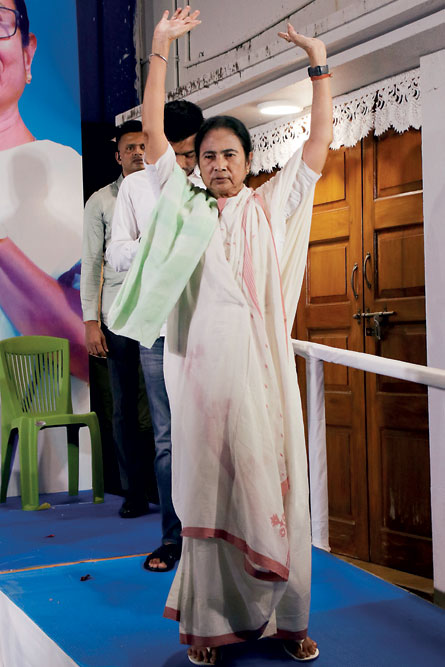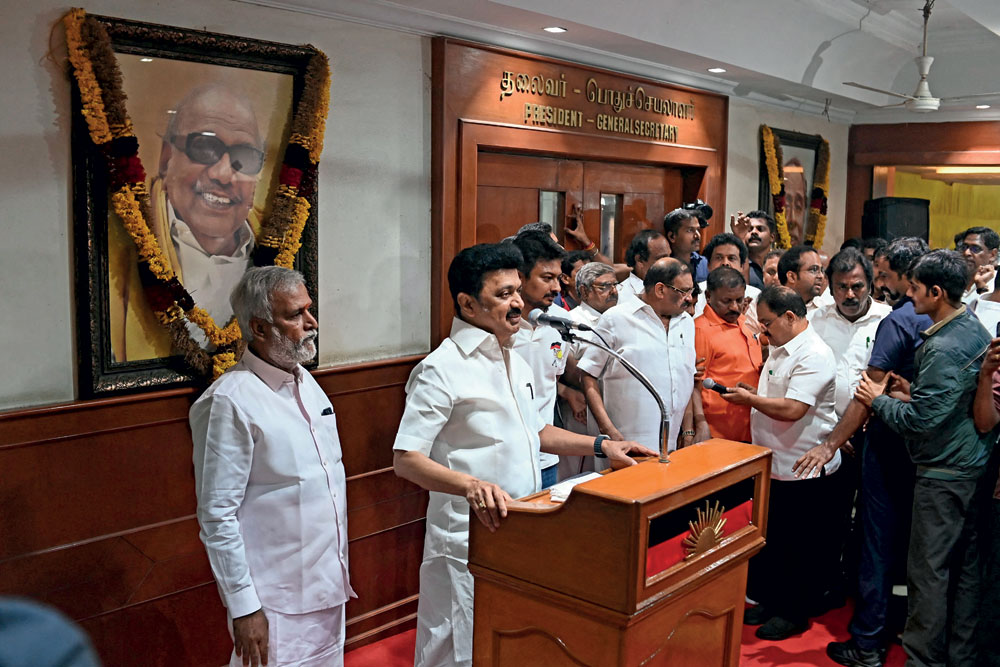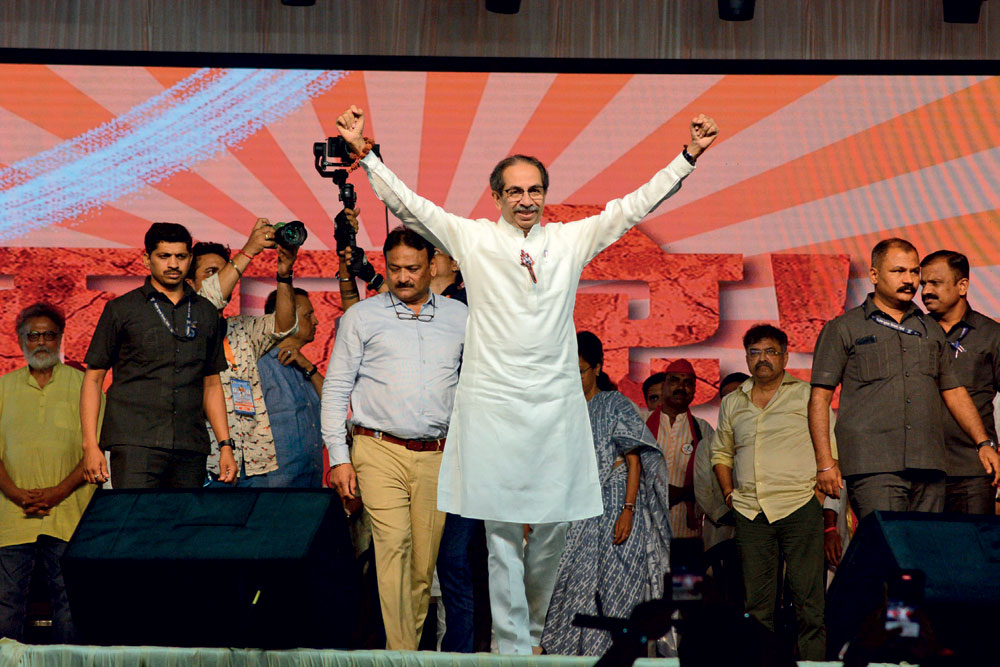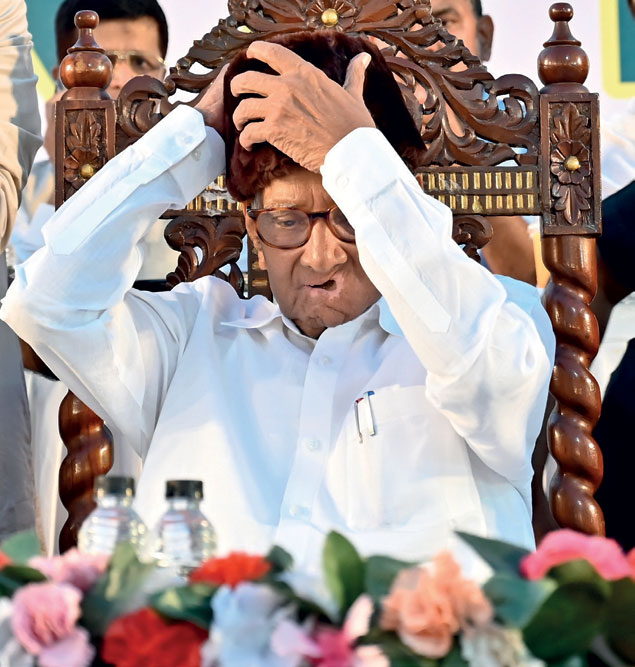Return of the Satraps
Five of them not only held on to their turfs but emerged stronger as well
 Amita Shah
Amita Shah
 Amita Shah
|
07 Jun, 2024
Amita Shah
|
07 Jun, 2024
/wp-content/uploads/2024/06/Returnofthesatrapas1.jpg)
Samajwadi Party chief Akhilesh Yadav in Kannauj, June 5, 2024
AS PRIME MINISTER NARENDRA MODI lauded a third term for the National Democratic Alliance (NDA), five regional leaders of the Opposition gained a grip on their turfs.
When Samajwadi Party (SP) leader and former Uttar Pradesh (UP) Chief Minister Akhilesh Yadav held a roadshow in Ayodhya during the 2022 Assembly elections in the state, he flaunted his Hindu identity by invoking Ram and Krishna. He talked of the ‘Ganga-Jamuni Tehzeeb’, a phrase symbolising Hindu-Muslim harmony, underscored his socialist roots, and promised development, addressing people in the temple town, the soul of BJP’s Hindutva ideology. At that time, the Ram temple was under construction. None of the SP chief’s gambits helped. BJP won 255 of the 403 Assembly seats, including Ayodhya, bringing the party back to power for a second term in UP. But Akhilesh, caught in the quandary of his party being limited to Muslim-Yadav support, had apparently learnt his lessons. Two years later, targeting votes outside this core voter base, to reach out to the non-Yadav Other Backward Classes (OBCs), Akhilesh decided to put up 57 non-Yadav candidates in the 62 seats it contested as part of the I.N.D.I.A. bloc, forging the slogan ‘Pichde, Dalit, Alpasankhyak’ in the Lok Sabha polls. It paid off, giving Akhilesh his biggest triumph since the mantle was passed to him by his late father Mulayam Singh Yadav, and humbling BJP in the heart of the Hindi heartland. SP, with 37 seats, outnumbered the 33 of BJP, which even lost Faizabad, the Lok Sabha seat in which the Assembly segment of Ayodhya falls, four months after Prime Minister Narendra Modi’s consecration of the Ram temple in a grand ceremony. The SP’s Awadhesh Prasad, a nine-time MLA, defeated BJP’s Lallu Singh, who had won the Faizabad seat in 2014 and 2019. BJP was hoping the temple would bring it electoral blessings, amplifying its Hindutva narrative, particularly in UP, the most populous state with 80 Lok Sabha seats.

Of the 57 seats, SP fielded 27 non-Yadav OBCs, two more than BJP, 11 upper castes, four Muslims, and 15 Dalits. Seven of SP’s Dalit candidates won in the state, where Mayawati’s waning Bahujan Samaj Party (BSP) did not win a single seat and its vote share dropped to below 10 per cent, despite the party contesting 79 seats. BJP, which contested 75 seats, fielded 34 from upper castes and 16 in Scheduled Caste (SC) reserved seats. Unlike 2019, when SP won just five of the 37 seats it had contested in an alliance with BSP, which won 10, this time the chemistry in the alliance with Congress, which contested 17 seats and won seven, was visible on the ground. SP’s Yadav candidates, all of whom are from the family, were fielded in the other five seats, which have been its turf. Akhilesh himself stood in Kannauj, which SP lost to BJP in 2019 when his wife Dimple Yadav was the candidate. A more self-assured Dimple won from Manipur, SP founder Mulayam Singh’s seat which she hadwon in a bypoll after his death. Dharmendra Yadav, Mulayam’s brother Abhay Ram Yadav’s son, was fielded in Azamgarh; Aditya Yadav, Mulayam’s brother Shivpal Yadav’s son, in Badaun; and Akshay Yadav, Mulayam’s cousin Ram Gopal Yadav’s son, in Firozabad.
SP fielded 27 Non-Yadav OBCs, two more than BJP, 11 upper castes, four Muslims, and 15 Dalits. Seven of SP’s Dalit candidates won in the state, where Mayawati’s waning BSP did not win a single seat and its vote share dropped to below 10 per cent despite the party contesting 79 seats
SP had put up 10 Yadav candidates in 2019, including four from Mulayam Singh’s family, banking on the Yadav and Muslim votes in the state where Muslims constitute 19 per cent of the population and Yadavs about 9 per cent. But it was this affiliation with the two communities that had deterred voters outside these sections from supporting SP. This time, the party managed to surpass its Muslim-Yadav core base, making a dent in a vote bank BJP had nurtured since 2014 when Modi came to power at the Centre.
In neighbouring Bihar, the Yadav family of Rashtriya Janata Dal (RJD) leader and former Chief Minister Lalu Prasad failed to have a similar resonance in terms of seats, with a formidable alliance of Nitish Kumar’s Janata Dal (United), BJP, Chirag Paswan’s Lok Janshakti Party (Ram Vilas), and the Hindustani Awam Morcha led by former Chief Minister Jitan Ram Manjhi sweeping the state with 30 of the 40 seats. Though RJD got a vote share of 22.14 per cent, higher than that of JD(U) at 18.53 per cent and BJP at 20.51 per cent, it won only four seats. In 2019, RJD did not win a single seat while NDA had swept the state with 39. Lalu Prasad’s daughter Misa Bharti, a Rajya Sabha MP, won the Pataliputra seat, defeating BJP’s two-time MP Ram Kripal Yadav, but his other daughter Rohini Acharya lost to BJP’s Rajiv Pratap Rudy in Saran, her father’s bastion. Both Nitish Kumar, who had made a last-minute switch to NDA from I.N.D.I.A., and BJP won 12 seats each.

Away from the Hindi heartland, in the eastern part of the country, West Bengal also came in the way of BJP reaching the magic figure of 272, with Chief Minister Mamata Banerjee further strengthening her hold on the state. Of the 42 seats, Banerjee’s Trinamool Congress (TMC) won 29 and increased its vote share by 2 per cent from 43.3 to 45.76 per cent, upsetting the calculations of BJP which was banking on increasing its tally in the state. BJP’s score dropped to 12 from 18 in 2019, when it was 22. Banerjee had dismissed the exit polls which gave BJP more numbers than her party, saying she had seen such predictions going wrong in 2016, 2019 and 2021. She retained her hold on South Bengal and made inroads into North Bengal where BJP had won seven of the eight Lok Sabha seats in 2019. Her government’s own welfare schemes for women, Muslim consolidation amidst BJP’s euphoria over the Ram Mandir, and the absence of a formidable regional face in BJP all helped Banerjee as she reigned supreme, tiding over anti-incumbency with votes against her getting divided among the Left, Congress and BJP.

Among those who won in the state, is Mahua Moitra from Krishnanagar for a second term, less than six months after she was expelled from Parliament on the recommendation of Lok Sabha’s Ethics Committee which had found her guilty of having shared her credentials to the parliamentary website with others and accepting gifts in exchange for favours. The Central Bureau of Investigation (CBI), on the directions of Lokpal, the anti-corruption ombudsman, had booked her in March. TMC’s No 2, the party’s national general secretary Abhishek Banerjee, broke West Bengal’s record for the highest victory margin at 7.1 lakh votes in the Diamond Harbour constituency, defeating BJP’s Abhijit Das. The party’s candidate, cricketer-turned-politician Yusuf Pathan, defeated five-time Congress MP Adhir Ranjan Chowdhury in the Muslim-dominated Baharampur seat, while Kirti Azad, also a former cricketer who was with BJP till 2015, defeated BJP’s former state chief Dilip Ghosh from Bardhaman- Durgapur by over a lakh votes.
Down South, MK Stalin retained his Dravidian party’s hold over Tamil Nadu, denying BJP a single victory in the 23 seats it contested as the DMK-led I.N.D.I.A. bloc swept the state in a four-cornered contest
IN WESTERN INDIA, two regional players in Maharashtra—Uddhav Thackeray’s Shiv Sena (UBT) and the Sharad Pawar-led Nationalist Congress Party (NCP)—regained their grip on their bastions, crushing the hopes of Mission 45-plus of the ruling Mahayuti coalition comprising the Eknath Shinde-led Shiv Sena, BJP, and the Ajit Pawar-led NCP. The political realignment seemed to have backfired, with people largely favouring Uddhav Thackeray and Sharad Pawar. Of the 15 seats the Shinde faction fought, it won seven, and Ajit Pawar’s NCP one of the five it contested. Far from helping BJP increase its tally, Maharashtra delivered a defeat to the party which fought in 28 seats and ended up winning nine, down from 23 in 2019. While Union minister Nitin Gadkari won from Nagpur, the headquarters of the Rashtriya Swayamsevak Sangh (RSS), his Cabinet colleague Piyush Goyal was the only candidate from the Mahayuti to win in Mumbai city’s six seats. Of the 48 seats in the state, NDA won 17. While the issue of Maratha quota hurt NDA in the Marathwada region, the Opposition’s campaign that the BJP-led government would tamper with the Constitution dented BJP’s share of Dalit votes. In the Opposition Maha Vikas Aghadi (MVA), it was Congress that turned out to be the biggest winner with 13 of the 17 seats it contested, making a decisive return from one seat in 2019. The Shiv Sena (UBT) won nine of the 21 it contested and Sharad Pawar’s NCP seven of 10, including that of his daughter Supriya Sule who was taking on Sunetra Pawar, wife of Sule’s cousin Ajit Pawar, in the family bastion of Baramati.

Down south, Tamil Nadu Chief Minister MK Stalin retained his Dravidian party’s hold over the state, denying BJP a single victory in the 23 seats it contested as the Dravida Munnetra Kazhagam (DMK)-led I.N.D.I.A. bloc swept the state in a four-cornered contest with alliances led by the AIADMK and BJP, besides the Social Democratic Party of India (SDPI) and Seeman’s Naam Tamilar Katchi (NTK). BJP’s state chief K Annamalai, a former IPS officer who galvanised the party cadre to go it alone without former ally AIADMK and had emerged as the party’s hope to get a few seats in the state, lost in Coimbatore to DMK’s Ganapathy Rajkumar by over a lakh votes. Both Annamalai and Rajkumar belong to the Kongu Vellala Gounder community, dominant in the western parts of the state. Though BJP’s vote share improved as compared to 2019, with the party’s entire top leadership campaigning, it is Congress which gained in terms of numbers, winning nine seats.
Even as BJP relied on free rations for the poor, Stalin highlighted his own welfare schemes like the free breakfast scheme for schoolchildren, `1,000 a month for women, and free bus travel for women on state-run buses. He campaigned across the state, promising social justice and taking on Modi over the reservation policy and the Good and Services Tax (GST), and alleging that BJP would alter the Constitution. He also raised the issue of Bills being stalled by Governor RN Ravi with whom DMK’s face-off is likely to continue.
Barring Banerjee, the other regional players are family parties whom BJP has been targeting over nepotism. But that doesn’t seem to have dented their popularity. They have held on to their citadels, each scripting their own strategy in what had seemed like a make-or-break election. The satraps not only survived but also ensured they would occupy more seats in Parliament, confronting the treasury benches with a mightier Opposition.

/wp-content/uploads/2025/06/Cover-OpenMinds2025.jpg)












More Columns
Indian Companies Have a Ransomware Vulnerability Open
Liverpool star Diogo Jota dies in car crash days after wedding Open
'Gaza: Doctors Under Attack' lifts the veil on crimes against humanity Ullekh NP